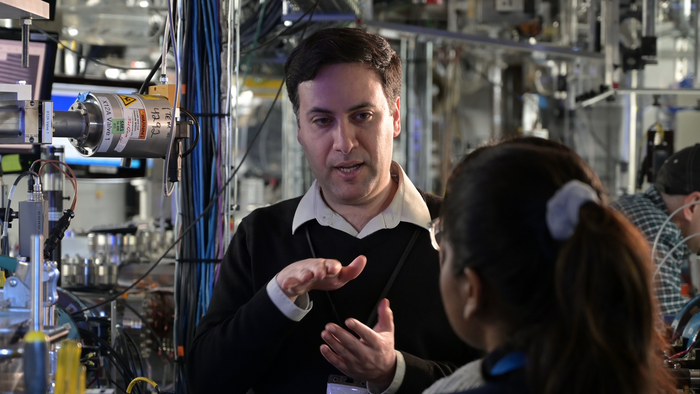Navid Vafaei-Najafabadi is a scientist who wears many hats. At Stony Brook University, he is an assistant professor in Department of Physics and Astronomy and leads the Plasma Accelerator Group. At the U.S. Department of Energy’s Brookhaven National Laboratory, Vafaei-Najafabadi is the facility scientist at the Accelerator Test Facility (ATF), where he helps set the scientific direction of the work performed there. The research and outreach laid out in his award-winning proposal has inextricable ties to both institutions, making the National Science Foundation’s (NSF) Faculty Early Career Development (CAREER) Program grant a catalyst for greater collaboration between the two institutions.

Credit: Brookhaven National Laboratory
Navid Vafaei-Najafabadi is a scientist who wears many hats. At Stony Brook University, he is an assistant professor in Department of Physics and Astronomy and leads the Plasma Accelerator Group. At the U.S. Department of Energy’s Brookhaven National Laboratory, Vafaei-Najafabadi is the facility scientist at the Accelerator Test Facility (ATF), where he helps set the scientific direction of the work performed there. The research and outreach laid out in his award-winning proposal has inextricable ties to both institutions, making the National Science Foundation’s (NSF) Faculty Early Career Development (CAREER) Program grant a catalyst for greater collaboration between the two institutions.
The NSF CAREER program empowers early career scientists and engineers by providing funding that helps them build a solid foundation to conduct cutting-edge research and serve as a mentor and academic role model for the students they work with. Vafaei-Najafabadi’s proposal for compact, plasma-based particle and radiation beams sources aims to improve the fundamental way that particle accelerators function.
“We’re trying to create the next generation of accelerators and the ATF is one of a handful of places in the U.S. that are at the forefront of this kind of work,” said Vafaei-Najafabadi. “It is a unique place that provides special high-power lasers that cannot found anywhere in the world, as well as the expertise required for supporting such experiments. The high-impact results that will come from ATF research don’t just impact the Laboratory—they ripple out to the scientific community as a whole.”
Vafaei-Najafabadi and his team are working on new methods to replace current photoinjectors, which are a fundamental component of particle accelerators. Photoinjectors use laser pulses to drive electrons out of a photocathode—a surface with the ability to convert light into electrons—and into the accelerator. The proposed research aims to replace this paradigm by generating the same high-quality electrons through the interaction of high-power laser sources available at ATF with plasma, an ionized medium that is often referred to as the fourth state of matter. Using only lasers and a millimeter-scale gas cell, this “all optical injector” would replace meter-scale photoinjectors , allowing future accelerators to be much more compact.
“Generating high-quality electron beams from compact, plasma-based accelerators enables applications in areas such as high energy physics, femtosecond radiation source development, and medicine. Beyond plasma-based accelerators, methods developed in this proposal can be applied to fundamental plasma physics research,” explained Vafaei-Najafabadi.
“In his role as the facility scientist, Navid really helps set the scientific thrusts for the facility,” said Mark Palmer, director of the ATF. “He works closely with faculty, students, and our user community to push the science forward.”
Vafaei-Najafabadi’s Early CAREER Award grant will help build a foundation for launching this research. He intends to establish math and physics programs for undergraduate students at Stony Brook University, ensuring that diversity, equity, and inclusion are at the core. By bringing in new talent and ensuring more equal opportunities, the accelerator science community will benefit greatly from more students with an interest in graduate plasma and accelerator physics.
Brookhaven National Laboratory is supported by the Office of Science of the U.S. Department of Energy. The Office of Science is the single largest supporter of basic research in the physical sciences in the United States and is working to address some of the most pressing challenges of our time. For more information, please visit science.energy.gov.
Follow @BrookhavenLab on Twitter or find us on Facebook.




